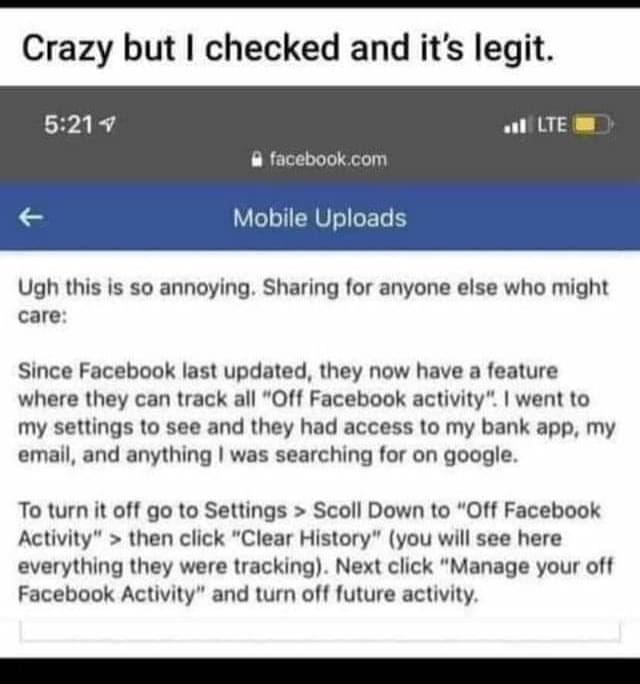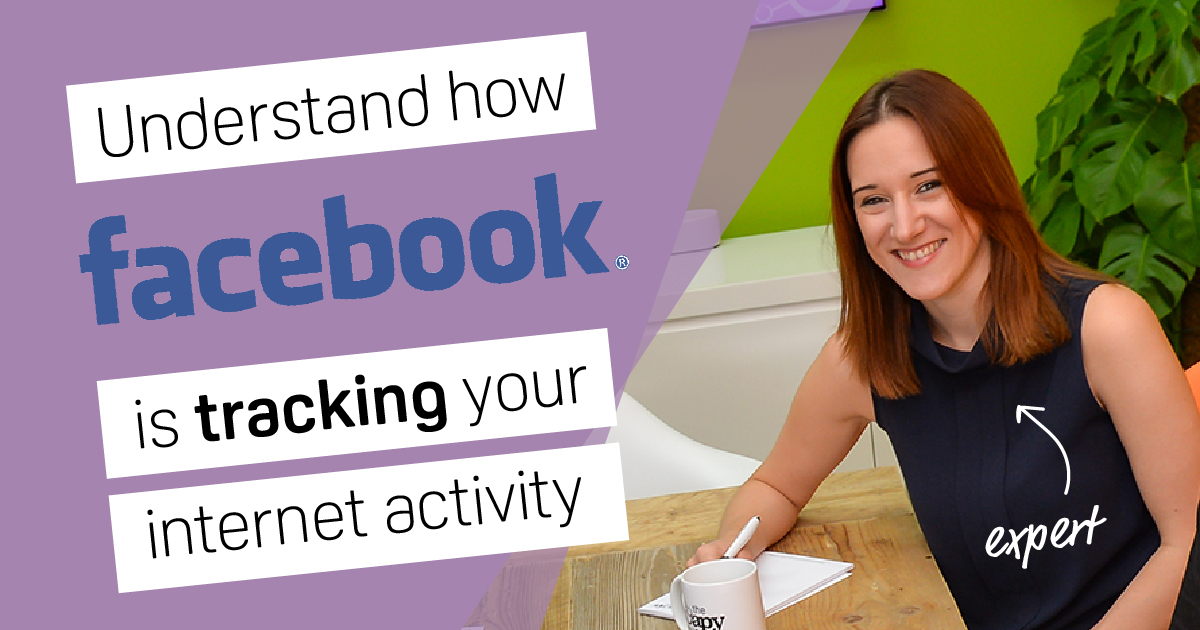There are a few posts circulating on Facebook at the moment stating that a recent update means it can now track your off-Facebook activity. While this is true, this is absolutely not a new feature.
In fact, this is something Facebook has been doing for a very long time.
You have also had the ability to be able to switch off settings allowing this form of tracking for ages. But while these posts are designed to scaremonger, now is the perfect opportunity to understand how it works and make informed decisions around the way you use Facebook.
What the posts are saying
There have been a few variations of these posts doing the rounds, but the basis is: “Since Facebook last updated, they now have a feature where they can track all off-Facebook activity.

An example of the posts currently doing the rounds on Facebook
“I went to my settings to see and they had access to my bank app, my email, and anything else I was searching for on Google.”
The posts then explain how you can switch off off-Facebook activity. Lo and behold, when you go into your settings you can see a long list of websites you recently visited. This, understandably, is freaking people out.
While it is a bit spooky to see your web browsing activity mapped out before your eyes, this is nothing new.
Why does Facebook track my browsing activity?
The simple answer: Your Facebook news feed is prime advertising space.
There’s a reason Facebook took $70.7 billion in revenue in 2019*. Its main source of income is advertising.
By tracking your activity and learning what you search for, Facebook is able to offer your news feed to advertisers wanting to target you with their products. The more relevant you are to an advertiser, the more your Facebook feed is worth.
For example, I recently visited a website to buy a new bike saddle from Sigma Sports. Almost instantly, my Facebook feed showed ads from Evans Cycles and Chain Reaction Cycles. Over the next 24 hours, I clocked ads from various sports brands showing me everything from new bikes to women specific cycling clothing.
I quite liked the look of one cycling jersey, so I clicked on the ad to take a quick look at the price. Once I popped back to my newsfeed, I was then seeing trendy women’s sports clothing from the likes of Fabletics, Under Armour and Nike.
I was also seeing adverts from Sigma Sports, showing me other products to go with my new bike saddle. This is called remarketing, allowing a business to target people who have already visited their site and encourage them to go back and spend more.
How many times have you been momentarily freaked out by seeing an advert on Facebook for something you were recently looking at?
How does targeted advertising work?
This is really easy for any business to do.
Without getting too techy, it’s all done through a snippet of web code called Facebook Pixel. Each advertiser can install this code on their website, opening up the door to whole new world of advertising possibilities.
This code allows businesses to re-advertise their products to anyone who has visited their website. It also gives the business more tracking tools to understand how people interact with their ads – helping them refine and more efficiently spend their advertising budgets.
Don’t hate businesses for doing this. This is a legitimate advertising technique that works brilliantly – especially for small businesses who are given a platform to advertise alongside the big brands, even with a much smaller budget.
I have seen incredible results and massive return on ad spend for small, independent businesses who are able to home in on their potential customers using Facebook.
So, what’s the catch with Facebook targeting?
Facebook is using your online activity to play advertisers off each other.
As soon as a business installs Facebook Pixel on their website, Facebook can now track your activity on that website (ie. what products you view, and what products you buy) and use that information to help competing brands also target you.
It’s genius, really, when you think about it
Does Facebook track EVERY website I visit?
Simple answer: No. Only websites with the Facebook Pixel code installed.
Facebook cannot view your bank account, nor does it have access to your emails. It cannot see private information, nor is it listening to you via your phone or camera, (hopefully!).
The more you look at the ads you are seeing and relate to your recent internet activity, the more you should begin to understand how you are being targeted.
Other ways Facebook knows what you are up to
It’s useful to also note that there are many other ways advertisers are able to use Facebook to their advantage (and to Facebook’s advantage).
Have you noticed how many high street stores (particularly big clothing brands) now ask for your email address to send your receipt? Collectively, a year’s worth of customer email addresses is worth a LOT of money, not just to the brand – but to Facebook.
A nifty little trick with Facebook advertising is to use a customer email database find a “lookalike audience.” By giving Facebook that list of emails, it can search for more potential customers with similar shopping habits for a business to target.
And hey presto! Facebook now knows your recent off-line shopping habits, too.
Should I switch off the tracking?
As always, basic personal internet safety rules apply. As these viral posts state, you do have the ability to switch off “off-Facebook” activity tracking.
The answer? It’s entirely up to you. Personally, as someone who understands the ins and outs of how Facebook works, I have no issue with Facebook collecting my activity.
I use the exercise as a way of continually tracking trends and finding ways of making Facebook work for small, independent businesses. So, I have a legitimate reason to keep it switched on.
Source: https://www.statista.com/statistics/268604/annual-revenue-of-facebook/




